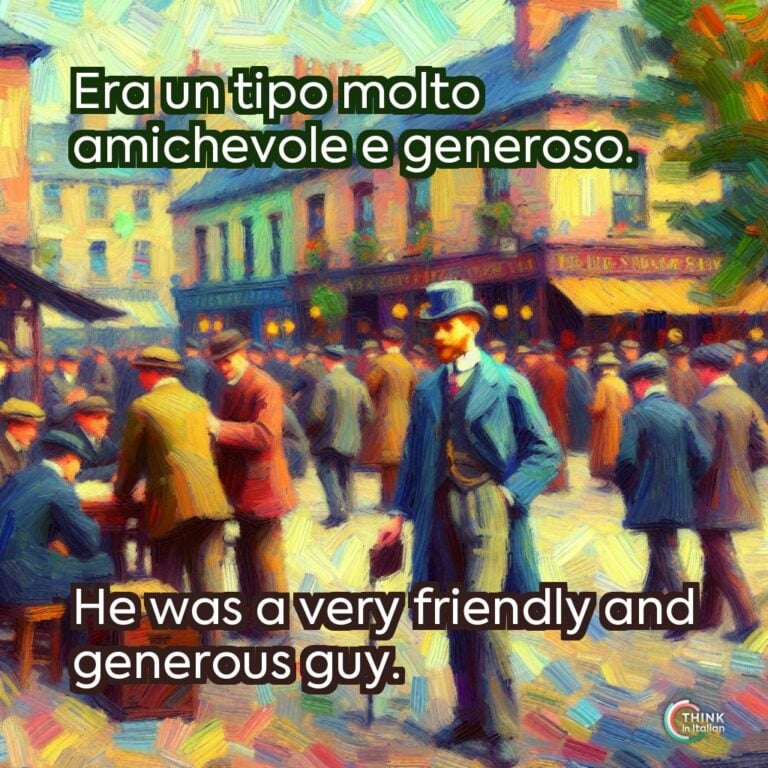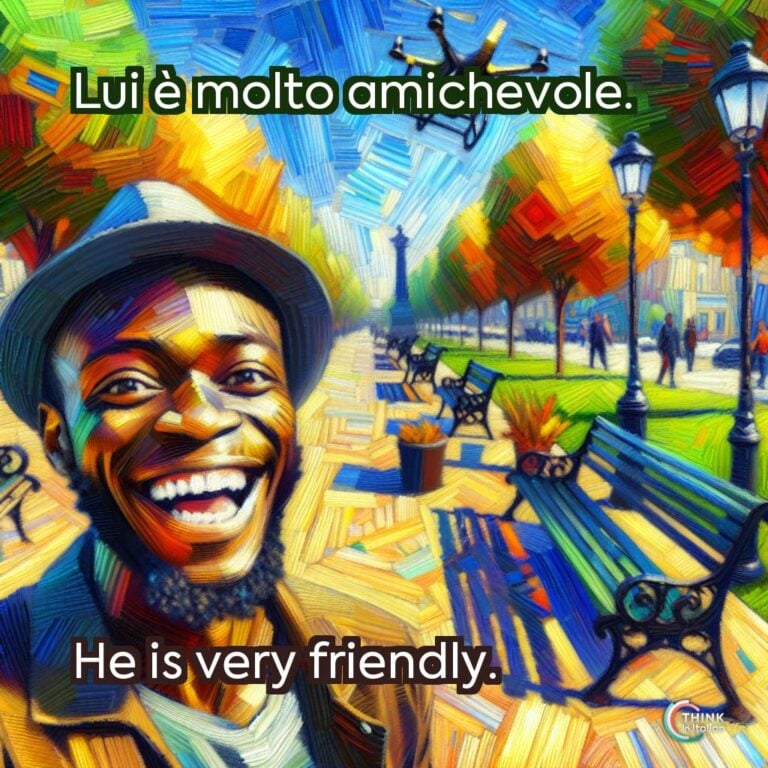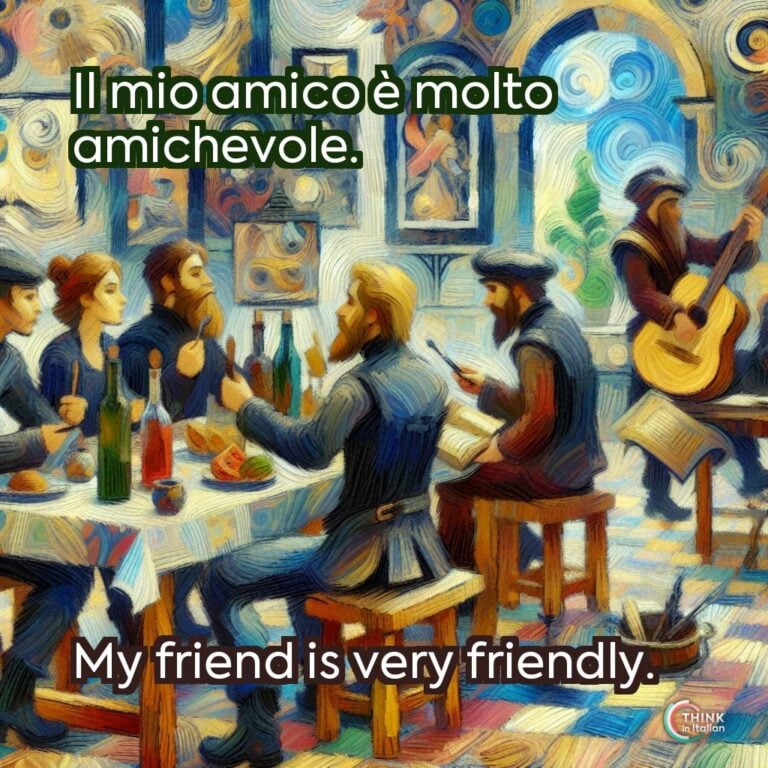Italian Adjectives
Before diving into the specifics of Italian adjectives to describe someone, let me give you a brief overview.
Italian adjectives must always agree in gender and number with the noun they modify. Here, I will provide you with the masculine singular form of each one, but always make sure you know who the subject of the sentence is to properly use it.
Also, I will not be able to list all the existing adjectives, because, of course, there are many. Most are synonyms or shades of other meanings. Therefore, here I will list the most common ones with corresponding examples.
Finally, notice that I will mainly use the verb essere or other stative verbs (verbs that describe a state) with all the adjectives. This is because, of course, we use adjectives to describe how people are.
Some of them can be used alternatively – sono delusa vs mi hai delusa (“I am disappointed” vs “you disappointed me”) – but here I will focus on their adjectival use only.
Get ready, and start learning now how to describe a person in Italian!
Italian Adjectives to Describe a Person
Italian Physical Adjectives
Physical traits are often the first thing we notice about someone. The most common physical adjectives in Italian are:
- Alto – tall
Lui è molto alto.
He is very tall.
- Basso – short
Lei è piuttosto bassa.
She is rather short.
- Magro – thin
Mia sorella è magra e atletica.
My sister is thin and athletic.
- Grasso – overweight
Il gatto è un po’ grasso.
The cat is a little overweight.
- Bello – beautiful
Quell’attrice è davvero bella.
That actress is really beautiful.
- Brutto – ugly
Non mi piace Antonio, lo trovo brutto.
I do not like Antonio, I find him ugly
If you want to go beyond the basics, consider these more sophisticated adjectives to describe someone’s appearance:
- Slanciato – tall and slender
Ha un corpo slanciato.
He has a tall and slender body.
- Curato – well-groomed, polished
È sempre molto curata.
She is always very well-groomed.
- Espressivo – expressive (for facial features)
I suoi occhi sono molto espressivi.
His eyes are very expressive.
Also, notice that Italian has two adjectives that mean “old”: vecchio and anziano. While vecchio can be used with items, objects, or concepts in general, anziano can be used with people only.
Moreover, saying that someone is vecchio instead of anziano, sounds a bit rude. So, make sure you use these adjectives properly!
Ora mio nonno è anziano, ma quando era giovane era molto attivo!
Now my grandfather is old, but when he was young, he was very active!
Describing Hair and eye Color in Italian
Hair and eye color are easy but important descriptors. When it comes to describing someone’s hair, you can either describe how the hair itself is, or how the person with that hair is.
It is just like saying that I have blond hair or I am blond!
- Capelli – hair
- biondi – blond
- castani – brown
- neri – black
- rossi – red
- bianchi – white
- grigi– gray
- lunghi – long
- corti – short
- lisci – straight
- ricci – curly
- mossi – wavy
Lei ha i capelli biondi e lunghi.
She has long, blonde hair.
- Persona – person
- bionda – blond
- mora – black-haired
- rossa – red-haired
- castana – brown
- brizzolata – grizzled
Luca era moro da bambino, ma ora è brizzolato!
Luca was black-haired as a child, but now he is grizzled!
As you can see, in Italian the word “hair” is plural. If you say capello, you are meaning one single hair, while if you say capelli, you mean the hair in general.
- Occhi – eyes
- azzurri – blue
- verdi – green
- marroni – brown
- neri – black
Sofia ha gli occhi marroni e grandi.
Sofia has big brown eyes.
Italian Personality Adjectives
- Gentile – kind
Lui è sempre gentile con tutti.
He is always kind to everyone.
- Maleducato – rude
Marta è spesso maleducata con i camerieri.
Marta is often rude to waiters.
- Simpatico – friendly
Lei è davvero simpatica.
She is really friendly.
- Antipatico – unfriendly
Non mi piace uscire con Matteo, è antipatico.
I do not like going out with Matteo, he is unfriendly.
- Intelligente – intelligent
Mio fratello è molto intelligente.
My brother is very intelligent.
To describe people with greater sophistication, consider adjectives like:
- Affascinante – fascinating, charming
Michela è una persona molto affascinante.
Michela is a very charming person.
- Altruista – selfless
È un uomo veramente altruista.
He is truly selfless.
- Egoista – selfish
Nico pensa solo a se stesso, che egoista!
Nico only thinks about himself, such a selfish!
- Caparbio – stubborn but determined
È caparbio, ma sempre raggiunge i suoi obiettivi.
He is stubborn, but he always achieves his goals.
Using these words helps you paint a fuller picture of someone’s personality, especially when you need to capture a blend of traits, both positive and negative.
Italian Emotion Adjectives
If I have to choose only one thing to explain why I love language, I would say its ability to express emotions. As a linguist, I find it very fascinating, because words allow you to convey very abstract yet important concepts.
- Felice – happy
Sono felice di vederti.
I’m happy to see you.
- Triste – sad
Lei sembra un po’ triste oggi.
She seems a bit sad today.
- Arrabbiato – angry
Sei arrabbiato con me?
Are you angry with me?
- Stressato – stressed
Devo fare molti esami, sono stressata.
I have to do many exams, I am stressed.
- Preoccupato – worried
Non mi rispondevi al telefono, ero preoccupato.
You weren’t picking up the phone, I was worried.
- Emozionato – excited
Domani è il mio compleanno, sono emozionata!
Tomorrow is my birthday, I am excited!
- Sorpreso – surprised
Non me lo aspettavo, sono sorpresa.
I did not expect this, I am surprised.
- Deluso – disappointed
I tuoi genitori sono delusi dal tuo comportamento.
You parents are disappointed by your behavior.
- Contento – content, glad
Sono contenta che sei venuto.
I am happy that you came.
- Annoiato – bored
Non mi è piaciuta la festa, ero annoiata.
I did not like the party, I was bored.
- Confuso – confused
Non ho capito, sono confuso.
I did not understand, I am confused.
Adverbs for More Precise Descriptions
Using adverbs like molto (very), abbastanza (quite), or un po’ (a little) allows you to adjust the intensity of your adjectives, making your descriptions more accurate:
Lui è molto intelligente.
He is very intelligent.
Lei è abbastanza simpatica.
She is quite friendly.
Ready to Describe People in Italian
Now you’re equipped with the tools to describe people in Italian in a way that goes beyond the basics. Whether you’re talking about someone’s physical appearance, personality, or emotional state, the right adjectives can make your conversations more engaging.
So get out there, start practicing, and don’t be afraid to add some flair to your Italian descriptions!






